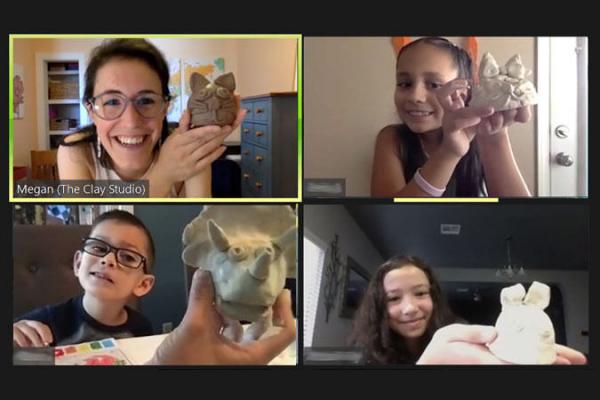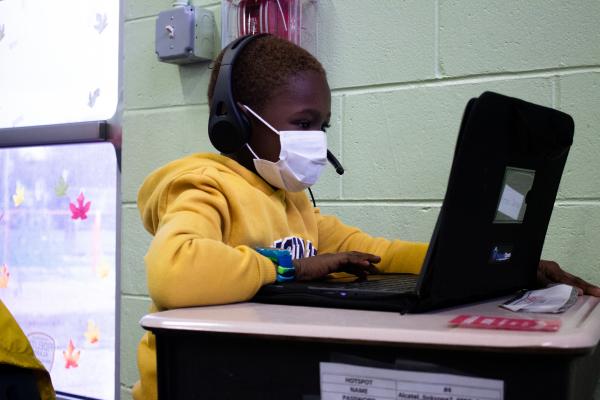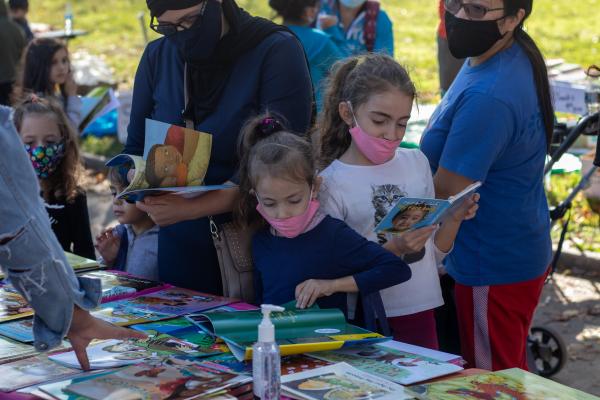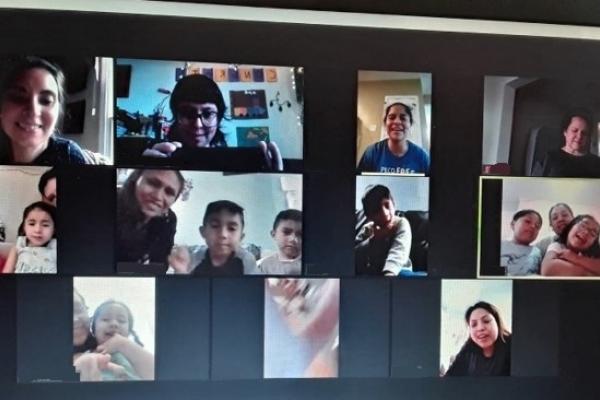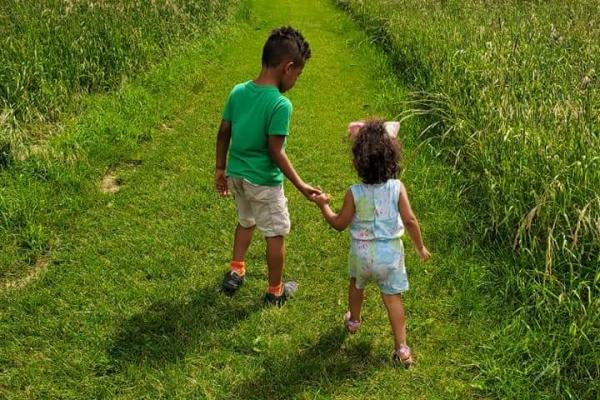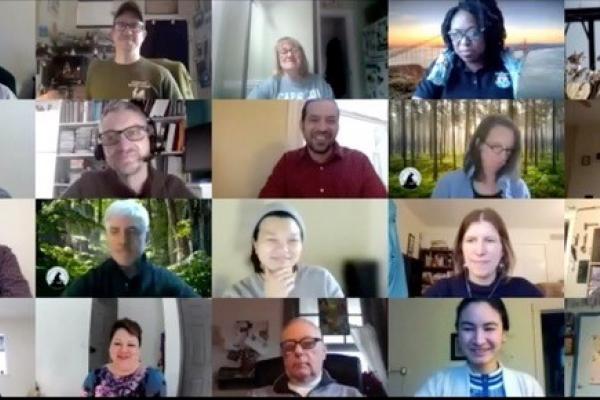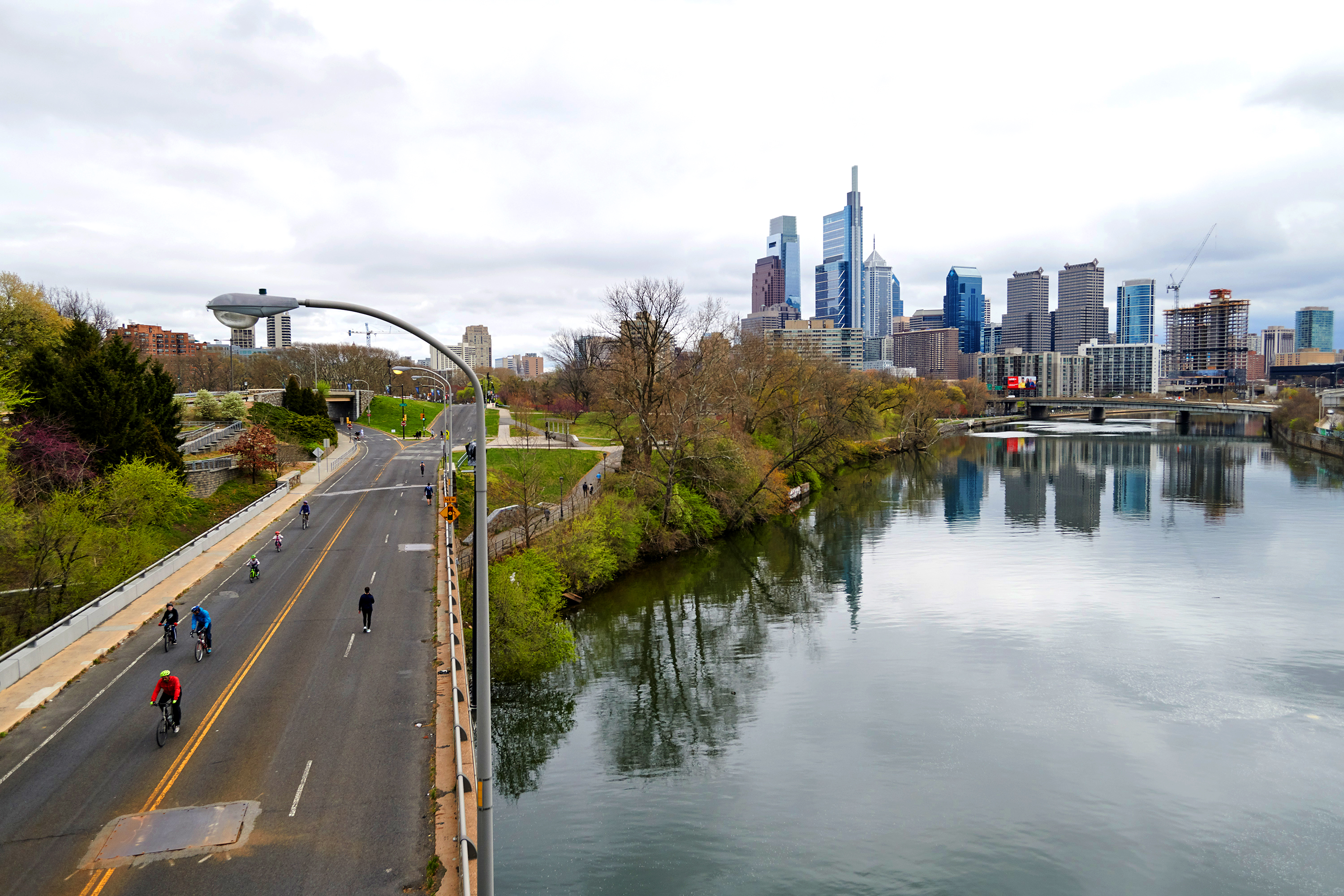
Photo by Albert Yee
In so many ways, 2020 was a year of extremes. Loss, sacrifice, and worry were byproducts of a relentless public health crisis. So were stories of hope and inspiration and the discovery of silver linings. The pandemic intensified the distance between those with access to health care, jobs, food, and education and those without, including many in marginalized communities. The murder of George Floyd echoed the senseless loss of so many Black lives and sounded the call for millions to demand racial justice with renewed urgency.
As a philanthropy, the William Penn Foundation has long sought solutions to community and social challenges in service of creating a just and vital city and region. Typically, we do that in the areas of education, the arts and public spaces, and through protection of the region’s water resources. But with the onset of COVID-19 and the national racial reckoning that soon followed, our focus shifted in two significant ways – first, to lead meaningful, collaborative, and rapid response to the unprecedented need facing the people and organizations in greater Philadelphia and, a few months later, to redouble our efforts to examine and improve our own systems and structures through the lens of social, racial, and economic equity.
The work in both areas is far from over, and we present this Annual Report as a record of the significant moment in the history of this foundation, our city, and our collective experience that was 2020.
Last year, several months into the pandemic, we wrote that it was hard to know what a new normal would look like. We said then, and we still believe now, that the region’s recovery and progress would be marked by the resiliency and resolve of its people, including those in the nonprofit sector whose ingenuity knows no bounds.
We remain committed to forming and fostering the connections, partnerships, and change in the months and years ahead that can contribute to a stronger, more equitable Philadelphia region – together.
Sincerely,

JANET HAAS, M.D.
Chair of the Board of Directors

SHAWN MCCANEY
Executive Director
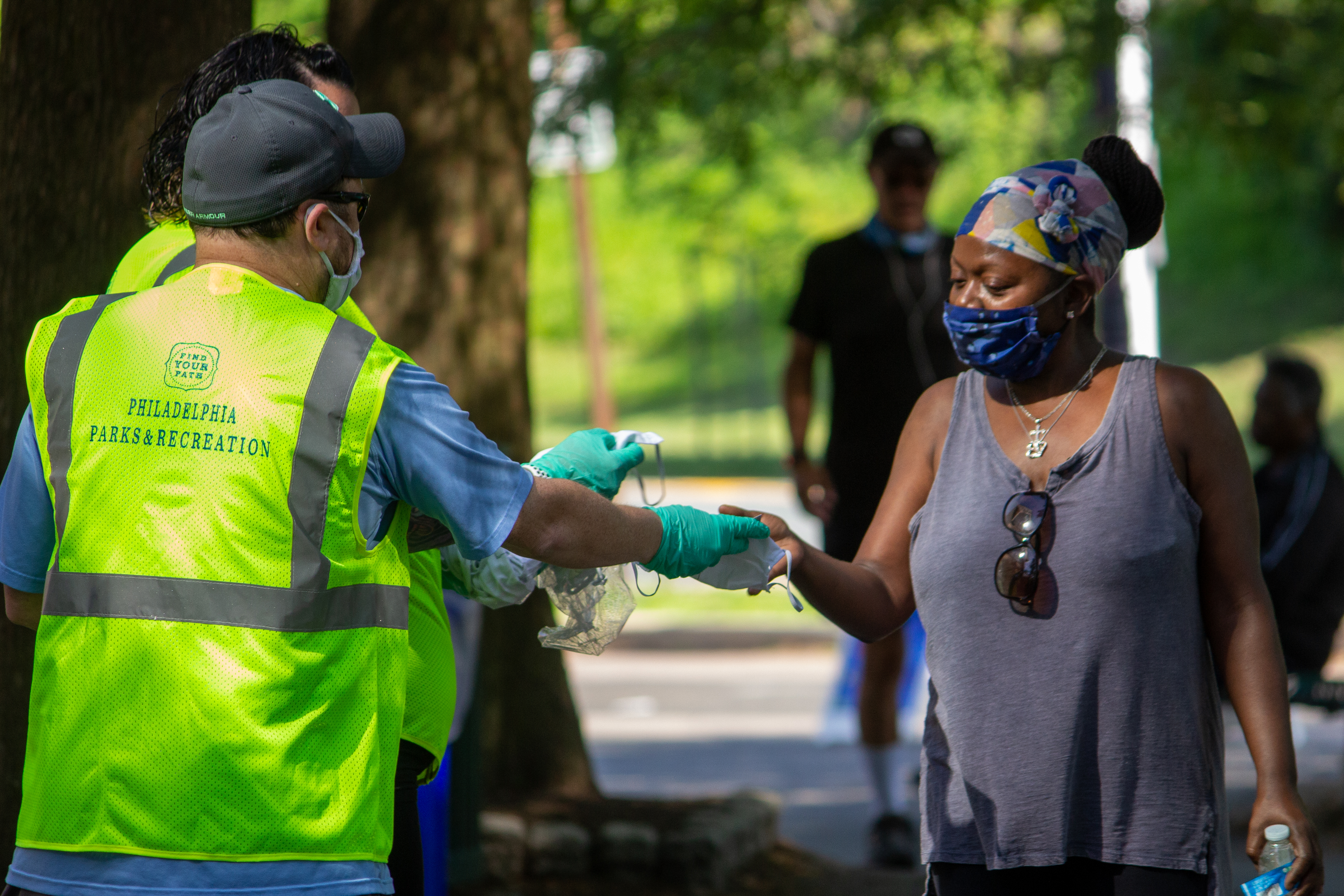
Photo by Courtesy of Philadelphia Parks & Recreation
Flatten the curve. Stay safe at home.
Beginning in March 2020, these became familiar refrains. The City of Philadelphia and much of the surrounding region ordered all nonessential businesses and government operations to close by March 16. At that point, most people assumed that the shutdown would last for a couple of weeks. But two weeks became a month, then six months, and then a year and more; and during that time, there wasn’t a person in our region who wasn’t touched in some way by the insatiable march of COVID-19.
Even in the earliest days, the level of need escalated quickly, and as the region’s largest philanthropic organization, the William Penn Foundation moved swiftly to take action in significant ways. Over the course of the next 12 months, the Foundation would become the lead or founding funder of nearly every major relief effort in Philadelphia, urging collaborative action along the way. We made grants in areas we didn’t usually fund; organized other funders to leverage the power of many; attracted money to the region from national sources; adjusted expectations and requirements for grants already in the field so that organizations could use the funding to pay salaries and stay whole; and rethought our own processes to unlock and reallocate emergency funding and resources. Ultimately, the response effort totaled nearly $25 million in Foundation investment.
The first of the emergency response funds was announced by March 19. William Penn Foundation was an early and ardent champion of the benefits of collective action and, with a $3 million lead grant, joined the United Way, the Philadelphia Foundation, and the City of Philadelphia to launch the PHL COVID-19 Fund with more than $6 million raised by that point. The PHL COVID-19 Fund rapidly deployed grants to nonprofits with demonstrated ability to serve at-risk populations, including seniors, people with disabilities, and those experiencing homelessness or who are economically disadvantaged. In a year’s time, the PHL COVID-19 Fund made nearly 600 grants, totaling $18.4 million, to organizations across the city.
At the same time, the staff of each of the Foundation’s program areas was rallying around response efforts to help mitigate the impact of the pandemic on grantees and their sectors. We sought to quickly reassure grantee organizations that grant payments would not be delayed and in fact, in many cases, would be accelerated; we increased flexibility on grant timelines and project work, in some cases making grant dollars available for critical general operating support; and identified other funders regionally and nationally who could invest here, too.
The power of collective action was evident again toward the end of the year when two national funders joined us in supporting the arts and culture sector in the region. In September, the William Penn Foundation joined the Ford Foundation in America's Cultural Treasures, a $156M national initiative to support outstanding arts organizations run by, and serving, people of color in their efforts to recover from the pandemic. The William Penn Foundation organized a local funding collaborative that includes: The Pew Center for Arts & Heritage, Barra Foundation, Connelly Foundation, Wyncote Foundation, and the Neubauer Family Foundation. In its role, WPF guaranteed the required $5 million match to ensure Philadelphia was a recipient city of this initiative, which in total will bring an additional $10 million to the city’s arts and culture sector. In December, the Foundation announced a new philanthropic partnership when the Andrew W. Mellon Foundation, another national funder, joined with us to provide more than $8 million in direct relief grants – with $4 million from the Mellon Foundation – to 37 Philadelphia cultural organizations.
What’s most important about these significant numbers is what they helped make possible. While many arts and culture organizations, as well as the region’s public space nonprofits, were able to pivot to digital programming and at-home instruction during the pandemic, many of them increased their efforts to serve the pressing needs of the people in their communities. Some, like Southeast Asian Mutual Assistance Association Coalition (SEAMAAC) and the Centennial Parkside Community Development Center, became sites for emergency food distribution; Bartram’s Garden staff built garden beds at private homes in Southwest Philadelphia to help nurture home-grown harvests. Others like the Asian Arts Initiative transformed indoor spaces, including galleries, into safe, supervised, socially distanced places for young people to engage with their virtual school work. And still others did their part to protect the importance of human contact. When the Wilma Theater could no longer take performances to senior centers, individual performers made phone calls to nursing home residents to share conversations, read poems, and connect person to person. All demonstrated the capacity for how arts, culture, and public space organizations can be critical parts of civic infrastructure and real-time solutions for people and communities in need.
By the end of March, the Foundation joined with Vanguard’s Strong Start for Kids Program™ and Reinvestment Fund to form and announce the Philadelphia Emergency Fund for Stabilization of Early Education. With $5 million from the William Penn Foundation, $2 million from Vanguard, and donations from several others, the initiative was administered by Reinvestment Fund and supported early learning organizations for children from birth to age five. Licensed childcare, family childcare, pre-k, and home visiting programs in Philadelphia were all eligible, including Head Start and Early Head Start providers. In total, more than 400 centers, which employ approximately 5,300 teachers and provide opportunities for more than 31,000 young children, were funded.
The evidence illustrates that, due to swift and extensive private and public investment, childcare closures have not been as severe as forecasted. In Philadelphia, these 400 providers received over $50 million to help them stay afloat. About 80 percent of this money came from the federal government, including the Payroll Protection Program (PPP), the Small Business Administration’s Economic Injury Disaster Loans, and other CARES Act funds. The other 20 percent was provided by philanthropy, bank loans, and even money borrowed from family and friends.
The Foundation’s financial assistance for education continued. In June, $2.6 million in grants were awarded to early learning initiatives, summer and afterschool programming, and urgent community needs benefiting families. Among many uses, Foundation support helped some to shift their practices to virtual operations and enabled others to focus on key areas like COVID testing and safe reopening strategies. Health Federation of Philadelphia (HFP), a health and human services organization that supports families with young children, found that technology, particularly reliable internet service, was a barrier to supporting families in the newly virtual environment. HFP purchased internet-enabled tablets for 750 families enrolled in home visiting programs to preserve their regular contact with the early childhood experts they rely on.
To help minimize the spread of COVID-19 and assist with the safe reopening of childcare centers, the Black Doctors COVID-19 Consortium provided COVID-19 testing for early learning program staff in high-risk communities of color. Similarly, Public Health Management Corporation provided free childcare health consultation services, personal protective equipment, and disinfectant supplies to some 800 Philadelphia early learning providers to support reopening plans; and others like Public Citizens for Children & Youth consulted with childcare centers on how to access federal PPP dollars.
In August, the Foundation pledged $1 million to support PHLConnectED, which provides reliable internet access for up to 35,000 households, including portable options for the significant number of students who experience housing instability. And, while this program was geared to meeting the needs of school students, it also provides essential connections for the entire household to access online resources, job opportunities, and social connections at a time when they were needed most. The Foundation also provided funding for learning materials at the City’s Access Centers – safe, supervised spaces for K-6 students to access their school’s virtual learning program.
On the Schuylkill Banks, part of the Circuit Trails’ hundreds of miles of multi-use trails, usage was 58% higher in March 2020 over March 2019, prompting the closure of MLK Drive to cars to make more room for pedestrians and cyclists. The same trend played out in parks; for Natural Lands, a regional land conservation organization, visitation to their nature preserves jumped significantly in April 2020 as compared to April 2019, with some preserves seeing as many as three times more visitors.
In addition to serving as places of refuge and retreat, networks like the Circuit Trails also served as an affordable, active mobility alternative for people in the region during the pandemic, as concerns increased about the potential for virus transmission on public transportation. The trails and the bike lanes that connect them became safe routes for commuters, particularly for essential workers.
Among grantees that lead environmental programming and advocacy work, dozens adapted to virtual learning and programming models and developed online training videos and webinars for volunteers. These online tools proved successful and created avenues for reaching new audiences, and many expect to continue using distance learning as a supplement to in-person programs into the future.
It was magnified during the earliest days of the pandemic that our grantees are critical to communities in many ways beyond their environmental programming. Through their after-school and summer programs focused on hands-on environmental education, they often also provide snacks and meals to children experiencing food insecurity, free childcare after school and during the summer months, and critical mentorship for area youth. Many of our grantees stepped up to continue providing these services in 2020, even as in-person programs were cancelled or limited during quarantine. For example, caring adults at organizations such as After School All Stars remained part of the support systems for youth engaged in their longer-term programs, which had temporarily gone online. Many of these programs delivered informal education to supplement virtual classes in creative ways, like do-it-yourself outdoor scavenger hunts. Others like Urban Promise supplied food to neighbors through food banks. With a region focused on recovery, these services became essential to community resilience.
We Don't Have Another 50 Years to Wait
When on May 25, 2020, George Floyd was killed beneath the knee of Minneapolis police officer Derek Chauvin, the outrage and anguish over generations of racial inequity and systemic, social injustice reached a crescendo. The calls for change marked a turning point in the national dialogue, and for the Foundation, it deepened our commitment to investing in programs and organizations that seek to level the playing field. In early June, the Foundation’s board committed to support a racially, economically, and socially just COVID-19 recovery, which influenced the relief and recovery funds and program area grants described above.
It also extended to work that included a new Racial Equity Grant Fund in our Great Learning program area. The initiative, a $400,000 pilot program, shares power through a community review committee – all people of color – who shaped selection criteria, the application process, and grantee selection. The pilot will fund general operating support for first-time grantees that are smaller, community-based organizations led by people of color. In addition, funding to diversify early education leadership and teacher pipelines continued, in recognition of the inequitable distribution of opportunity and the power of more diverse perspectives to improve educational experiences for children and families.
In Creative Communities, a strategy refinement to a more people-centric approach had already been underway to better integrate the significance of racial equity and economic inclusion in grantmaking. The events of 2020 underscored the essential role of arts, culture, and public space as places and platforms for healing, envisioning, creating, and connecting. They also affirmed that grantmaking in this area should support racially equitable and economically inclusive opportunities – reflective of people from all cultures and backgrounds – providing opportunities for people to experience the benefits of the arts, culture, and public space in Philadelphia and the greater region while also providing support to a broader cohort of diverse, community-based organizations. The refined strategy was introduced this fall with initial grants awarded in 2022.
The year’s racial reckoning also impacted approaches, programs, and operational infrastructure in different ways for Watershed Protection grantees. In some cases, dichotomies were highlighted given the fact that our portfolio includes grantees across four states in urban, suburban, and rural areas. For example, while visits to natural areas and trails surged in many areas, trails in some urban communities remained underutilized as residents worried about personal safety due to issues ranging from the pandemic to gun violence. To further explore the factors and barriers related to trail use, the Foundation funded a new study, Equity of Access to Trails, to help inform trail development and outreach efforts in underserved communities. A complementary report was conducted looking at equity of access to and use of environmental centers. Grantees are also recalibrating the “who” of the conservation work they are pursuing; they are intentionally focused on diversifying their staffs and boards, and better understanding how equitable the impact or benefit of their work will be across communities.
Across all of our grant programs, fostering board diversity has become an increasingly important focus. The Foundation extended funding of a partnership between ImpactED at the University of Pennsylvania and DiverseForce, a Philadelphia-based consulting firm that focuses on recruiting, retaining and developing diverse staff, leadership, and boards. Through this grant, the project partners deliver board service training to 55 professionals of color and match them with Foundation grantee organizations through a seven-month program. Prior to this round of funding, the program had already matched more than two dozen regional nonprofit organizations with 30 new board members of color.
All of this work aligns with the William Penn Foundation’s decades-long journey of evolving our own grantmaking to become more equitable and impactful, particularly in marginalized communities in the region. Clearly, the work is far from over. As Board Chair Janet Haas shared in June 2020, the fact that 50 years have passed since the beginning of the civil rights movement and still so much remains to be done emphasizes the need to hasten the collective pace of change for all of us. As Janet wrote, “We don’t have another half century” to wait.
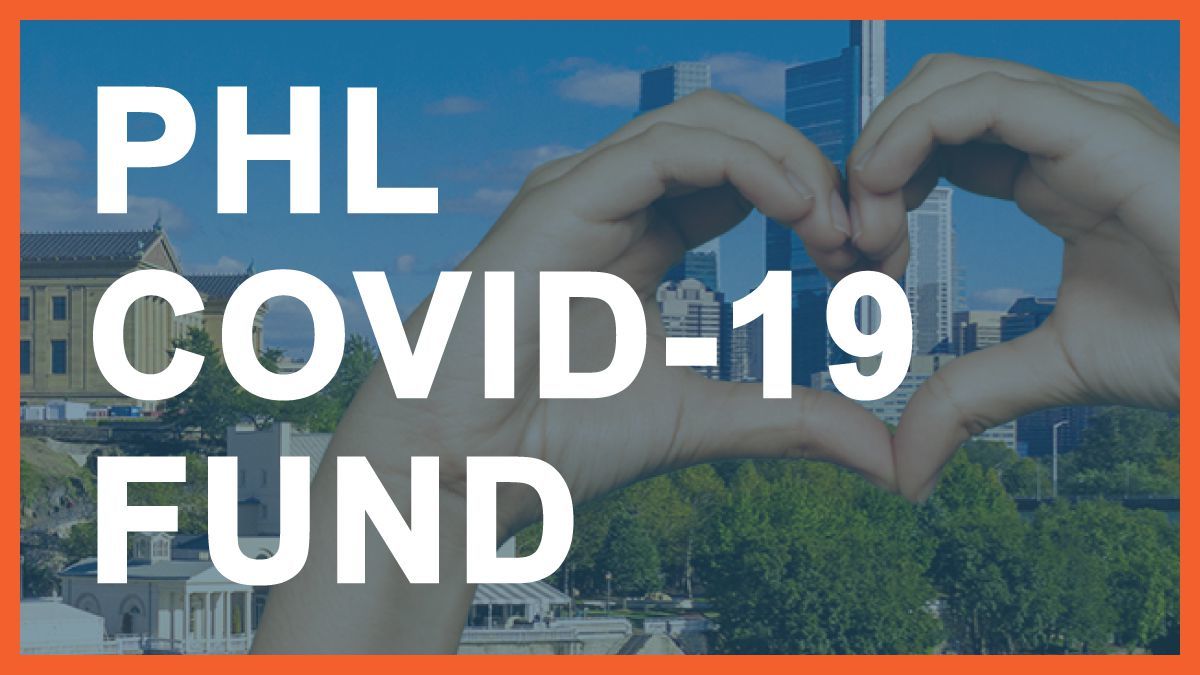
March | PANDEMIC RESPONSE
Regional Philanthropies Team Up to Launch PHL Covid-19 Fund
In the first of eight special board meetings held throughout 2020 to respond to the evolving impacts of the pandemic, our Board approved a $3 million grant to help launch the PHL Covid-19 Fund, joining United Way, the Philadelphia Foundation, and the City of Philadelphia to raise money for nonprofit organizations facing unprecedented uncertainties and challenges. Over the course of one year, the PHL Covid-19 Fund awarded close to 600 grants totaling $18.43 million and was supported by more than 8,000 individual donors.
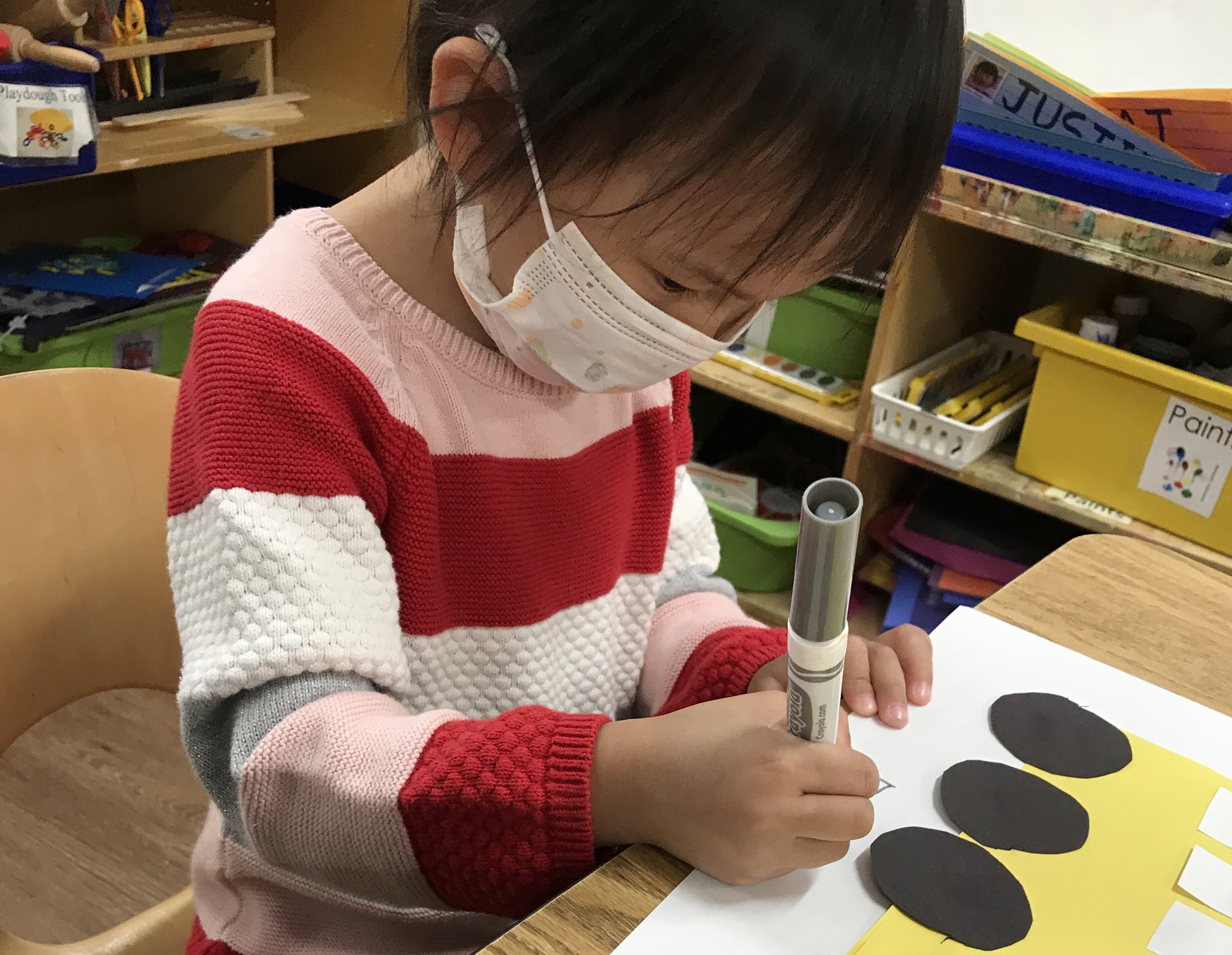
March | Great Learning
Fund Launched to Support Early Learning Programs
Philadelphia early learning providers were immediately impacted by the closures caused by the pandemic, with many struggling to sustain their organizations. The Philadelphia Emergency Fund for Stabilization of Early Education (PEFSEE) was seeded with a $5 million grant from William Penn Foundation and a $2 million grant from Vanguard’s Strong Start for Kids Program. 416 Philadelphia childcare providers, early intervention, and home visiting services received support through PEFSEE, which was administered by Reinvestment Fund and helped maintain over 31,000 of Philadelphia’s licensed childcare seats.
Photo Credit: Courtesy of Children’s Village
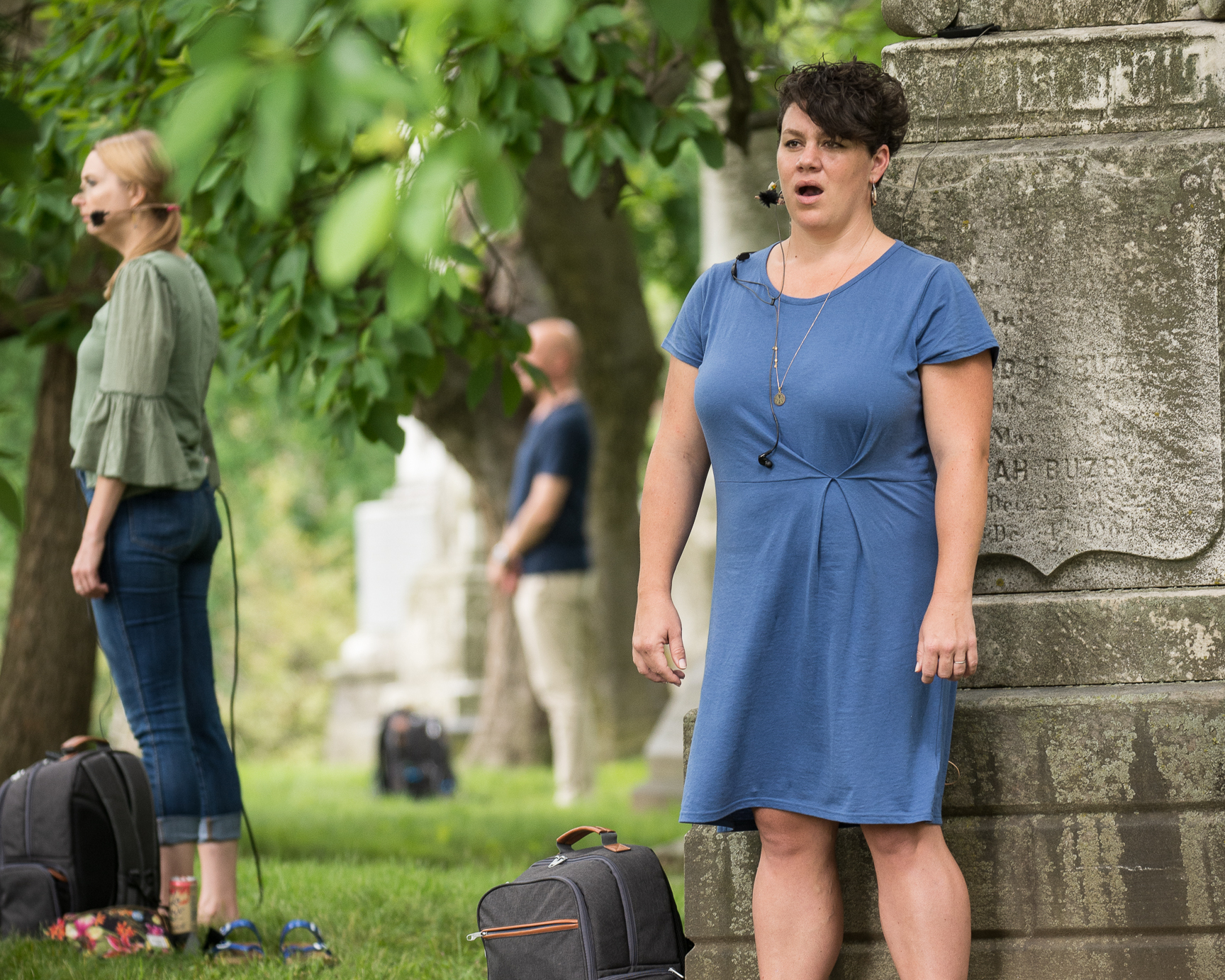
April | Creative Communities
COVID-19 Arts Aid PHL Fund Supports Arts and Culture Organizations
In partnership with the City of Philadelphia’s Office of Arts, Culture and the Creative Economy; the Greater Philadelphia Cultural Alliance; and the Philadelphia Cultural Fund; as well as seven other funders, William Penn Foundation made a lead grant of $2.5 million to help launch the COVID-19 Arts Aid PHL Fund. This fund awarded $4 million to 466 arts and culture organizations as well as 977 individual artists. Additionally, our Creative Communities Program accelerated approval of Core Support grants, awarding $6.6 million in general operating support for arts and culture organizations as soon as possible.
Photo Credit: John C. Hawthorne / The Crossing
April | PANDEMIC RESPONSE
"Step Up to the Plate" Effort Serves Philadelphians Experiencing Homelessness and Hunger
The need for reliable access to healthy food intensified as a critical need for many people in our region. Many funders, non-profits, for-profits, and the public sector came together to create Step Up to the Plate, a meal service designed for Philadelphians experiencing homelessness or hunger. This collaborative effort led by Broad Street Ministry, Project Home, and Prevention Point PHL has provided over 500,000 meals at sites in Center City, Kensington and South Philadelphia, along with access to health and social services. Over the course of the year, William Penn Foundation contributed more than $645,000 in support of this work.
Photo Credit: Prevention Point Philadelphia
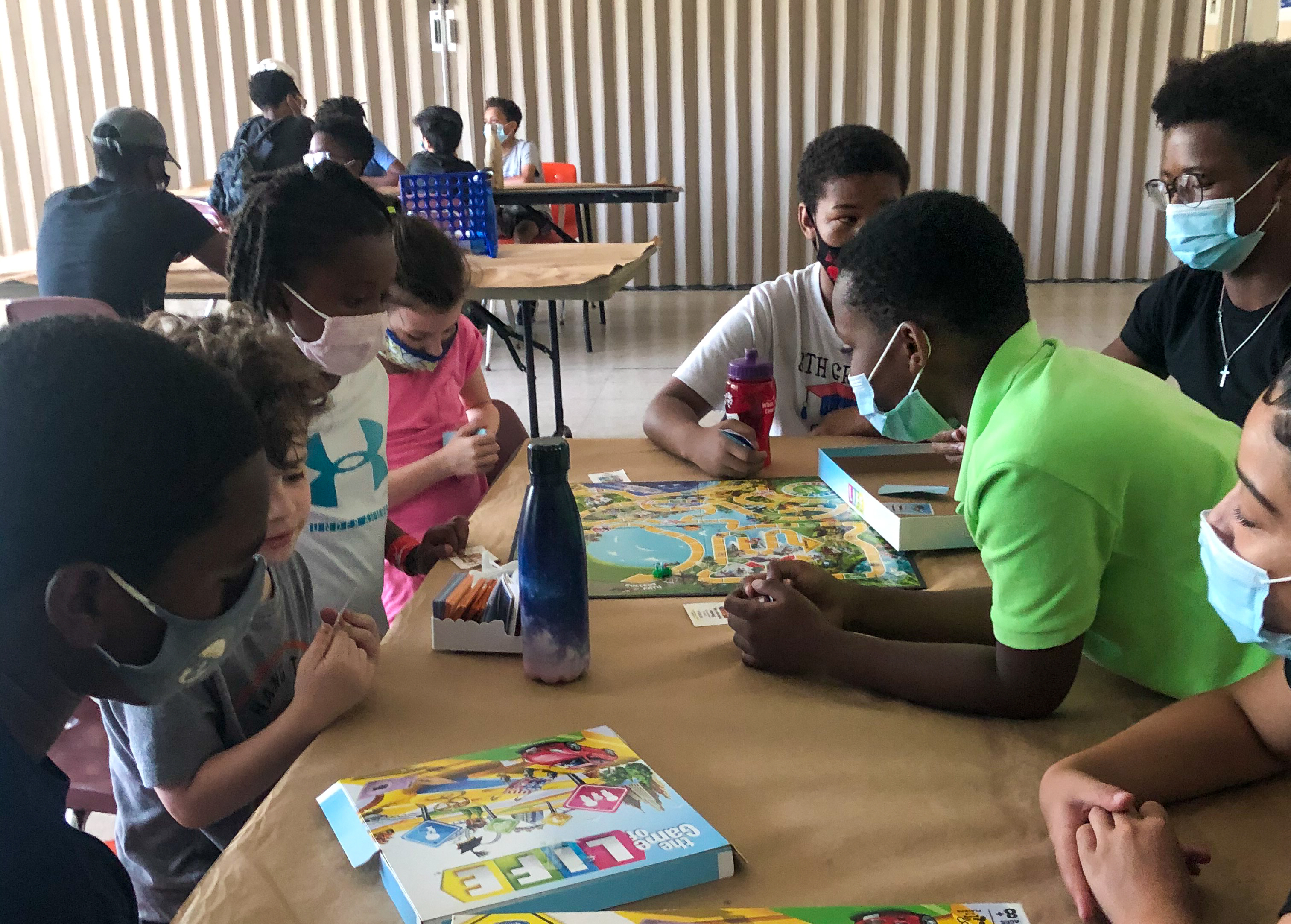
June | Great Learning
Ongoing Support for the Early Learning Sector
William Penn Foundation made a series of rapid response grants to facilitate safe learning opportunities, including funding for internet-enabled tablet devices for families to maintain connections with their home visiting programs, and supplies needed to ensure social distancing among Parks & Recreation camp groups. Continued support for the early learning sector included funding for early learning staff to access Covid-19 testing through the Black Doctors COVID-19 Consortium, and health consultation services and personal protective equipment provided by Philadelphia Health Management Corporation.
Photo Credit: Courtesy of Philadelphia Parks & Recreation
August | Watershed Protection
Government Funding for Conservation Increases
With the surge in use of outdoor spaces at the onset of the pandemic, steadily growing popularity of trails, green spaces, and waterways reached a tipping point, catalyzing several major conservation funding victories. In August, the government permanently authorized the Land and Water Conservation Fund via the Great American Outdoors Act, which will create jobs and revitalize or build new public spaces throughout the country. Funding wins specifically in the Delaware Basin were realized as well; the Delaware River Basin Commission and US Fish & Wildlife Service increased annual federal funding to the watershed by 60%, to $9.7 million. The state of Delaware also announced a new $50 million Clean Water Trust.
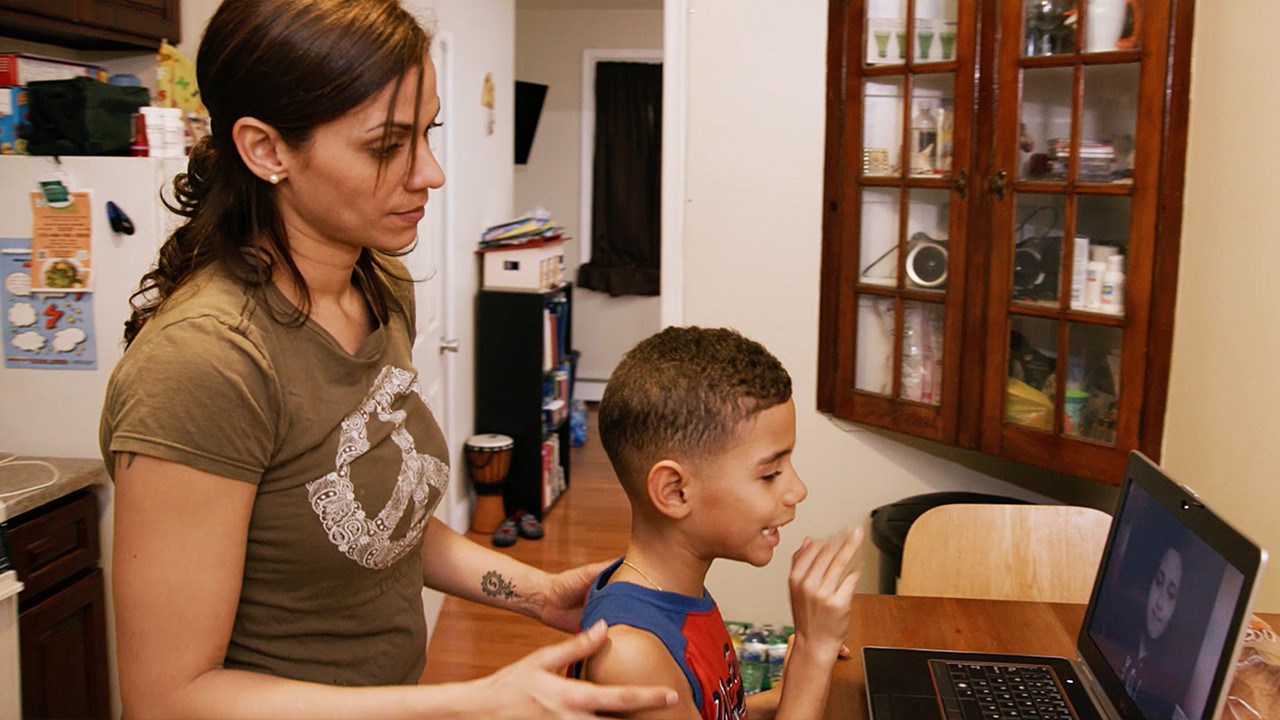
August | Great Learning
Partners Collaborate to Support Internet Access for Students
As online school became increasingly likely for the start of the 2020-21 school year, the City, Comcast, and philanthropic partners announced PHLConnectED, a multi-year program to help Philadelphia students secure internet access for the coming school year and beyond. William Penn Foundation provided $1 million to support the program to provide reliable internet access to approximately 35,000 households, including portable options for the significant number of K-12 students who experience housing instability.
Photo Credit: Comcast
September | Watershed Protection
Addressing Racial Inequities in the Environmental Sector
To support improved practices around racial equity in the environmental sector, our Watershed Protection Program awarded grants to Youth Outside, the New Jersey League of Conservation Voters, Conservation Voters of PA, and Legacy Land and Water Partners to offer tailored programs and training for staff and leadership of environmental organizations in the Delaware River watershed related to Diversity, Equity, Inclusion, and Justice (DEIJ). Offerings ranged from seminars to one-on-one workshops with nonprofits interested in building their cultural relevancy and capacity to increase diversity within their organization.
September | Great Learning
Designing a More Equitable Approach to Grantmaking
Our Great Learning team launched a pilot of a new approach to more equitable grantmaking, designed to award general operating support to small, education-focused organizations led by and centering people of color. The team engaged a group of community members to share responsibility and decision-making power by shaping the criteria and application and selecting the grantees.
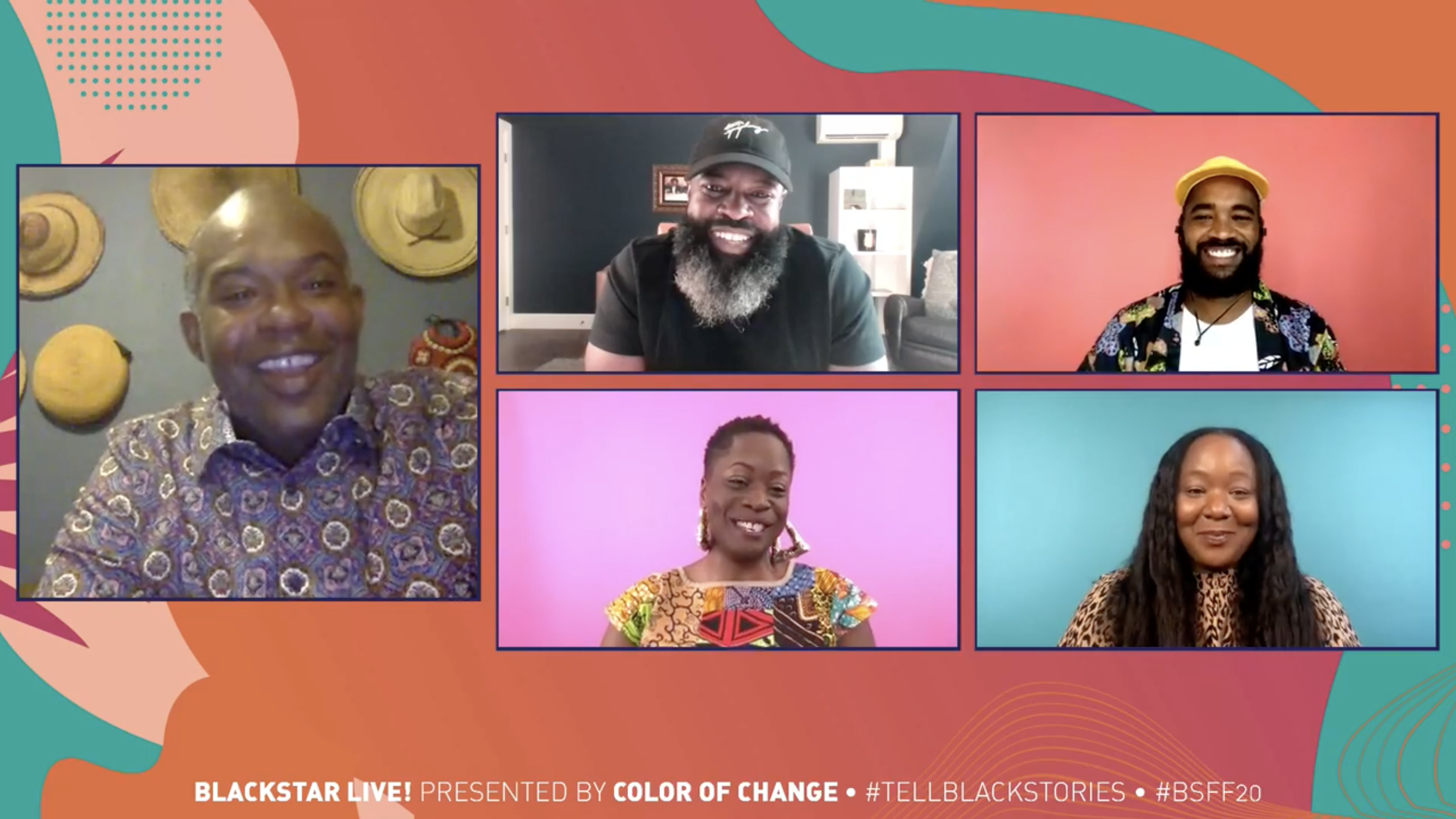
December | Creative Communities
National Funder Matches Support for Arts and Culture in Philadelphia
The Andrew W. Mellon Foundation, a national funder, recognized the strength of Philadelphia's arts sector and matched $4 million of William Penn Foundation support for arts and culture grantees. Collectively, we awarded more than $8 million in relief and recovery support grants to local arts organizations in late 2020.
Photo Credit: Daniel Jackson / BlackStar
Members of the Corporation
- Katherine H. Christiano
- Andrew Haas
- Christina Haas
- David Haas (Chair)
- Leonard Haas
- Thomas Haas (Vice Chair)
- Associate Member: Janet Haas M.D.
Board of Directors
- Katherine H. Christiano (Vice Chair)
- Andrew Haas
- Christina Haas (Vice Chair)
- Janet Haas M.D. (Chair)
- Leonard Haas (Secretary)
- Peter Haas
- Sarah Haas
- Thomas Haas
- Donald Kimelman
- Claire Lomax
- Howard L. Meyers
- Robert Victor
- Suzanne Welsh
- Frederick Haas (term ended 12/2020)
- Michael Pearson (term ended 12/2020)
Non-Voting Officers: Bryan Ulishney (Treasurer & Assistant Secretary), Shawn McCaney (Executive Director)
Foundation Staff
Executive
- Shawn McCaney, Executive Director
- Jessica Richards, Director of Program Operations & Planning
Programs
- Clare Billett, Senior Program Officer, Watershed Protection
- Nathan Boon, Senior Program Officer, Watershed Protection
- Kellie Brown, Senior Program Officer, Great Learning
- Amanda Charles, Senior Program Associate, Great Learning
- Stuart Clarke, Program Director, Watershed Protection (eff. 8/2021)
- Ebony English, Program Officer, Great Learning
- Cara Ferrentino, Program Officer, Creative Communities
- Andrew Johnson, Program Director, Watershed Protection (retired 6/2021)
- Chris Kieran, Senior Program Associate, Watershed Protection
- Hillary Murray, Senior Program Officer, Creative Communities
- Michele Perch, Program Officer, Watershed Protection
- Judilee Reed, Program Director, Creative Communities
- Lindsay So, Program Officer, Creative Communities
- Jennifer Stavrakos, Senior Program Officer, Great Learning
- Elliot Weinbaum, Program Director, Great Learning
- Shinell Young, Program Operations Assistant
Evaluation & Learning
- Hilary Rhodes, Ph.D., Director of Evaluation and Learning
- Elizabeth Thompson, Evaluation and Learning Officer
Communications
- Rebecca Morley, Director of Communications
- Jamie Quinn, Senior Communications Associate, Watershed Protection
- Kelsey Ruane, Senior Communications Associate, Great Learning
- Samantha Retamar, Communications Associate, Creative Communities
Administration
- Audrey Ang, Accounting Manager
- Tamika Holman, Senior Grants Management Associate
- Paola Meimaris, Administrative Support Specialist
- Joanne Sabasino, Senior Staff Accountant
- Barbara Scace, Director, Grants Management
- Samantha Shain, Data Solutions Manager
- Bryan Ulishney, Director of Finance and Administration
- Edward Wagner, Manager, Information Technology
Investments
- Amy Chan, Director of Investments
- John Cross, Director of Investments
- MaDoe Htun, Chief Investment Officer
- Jeffrey Jackman, Director of Investments
- Dane Kline, Director of Investments
- Grace Mathis, Investment Analyst
- Cayley Montoya, Investment Analyst
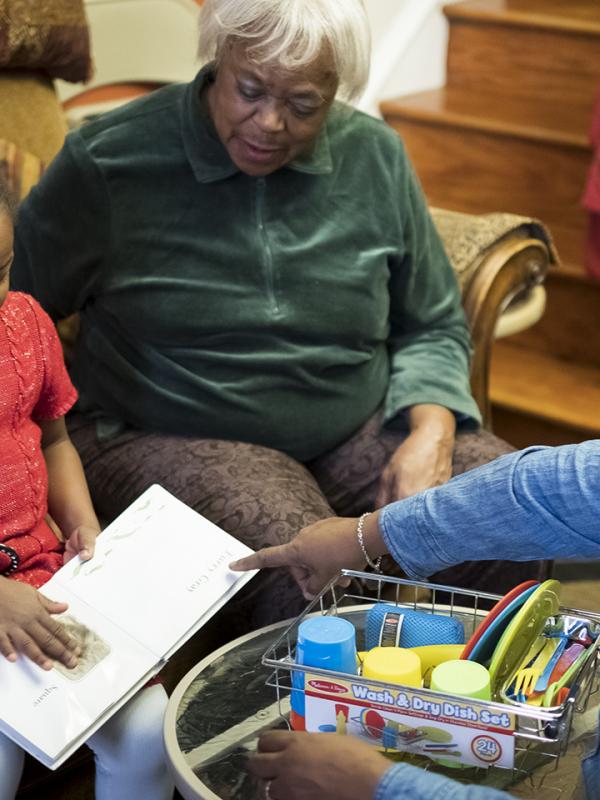
Creative Communities
- 11th Hour Theatre Company
- African American Museum in Philadelphia
- African Cultural Alliance of North America
- Al-Bustan Seeds of Culture
- Asian Arts Initiative
- Astral Artists, Inc.
- Awbury Arboretum Association, Inc.
- BalletX
- Barnes Foundation
- Black Lily Inc.
- Black Pearl Chamber Orchestra
- Bowerbird, Inc.
- Bread and Roses Community Fund
- Camden Repertory Theatre
- Centennial Parkside CDC
- Center for Art in Wood, Inc.
- Center for Emerging Visual Artists, Ltd.
- Conservation Center for Art and Historic Artifacts
- CultureTrust Greater Philadelphia
- Drexel University
- Eastern Pennsylvania Conference United Methodist Church
- Encore Series Inc
- Fairmount Park Conservancy
- Franklin Institute
- Friends of the Rail Park
- FringeArts
- Fund for Philadelphia, Inc
- HACE - Hispanic Association of Contractors and Enterprises
- Headlong Dance Theater
- Historic Germantown LLC
- Historic Philadelphia, Inc.
- Interact, Inc.
- Intercultural Journeys
- JUNK
- Kimmel Center Inc.
- Koresh Dance Company
- Kulu Mele African American Dance Ensemble Inc.
- KYL Dancers, Inc.
- Lantern Theater Company
- Leeway Foundation
- Mann Center for the Performing Arts
- Miami Foundation, Inc.
- Musicopia, Inc.
- National Consortium for Creative Placemaking
- Nueva Esperanza
- Opera Philadelphia
- Orchestra 2001, Incorporated
- Pennsylvania Academy of the Fine Arts
- Pennsylvania Ballet Association
- Pennsylvania Horticultural Society
- People's Emergency Center Community Development Corporation
- People's Light and Theatre Company
- Philadelphia Area Cooperative Alliance
- Philadelphia Chamber Music Society
- Philadelphia Chinatown Development Corporation
- Philadelphia Contemporary
- Philadelphia Dance Company
- Philadelphia Folklore Project
- Philadelphia Mural Arts Advocates
- Philadelphia Orchard Project
- Philadelphia Orchestra Association
- Philadelphia Photo Arts Center
- Philadelphia Young Playwrights
- PIDC Community Capital
- Pig Iron Theatre Company Inc.
- Quintessence Theatre Group
- Rock School for Dance Education
- Samuel S. Fleisher Art Memorial
- Schuylkill River Development Corporation
- Shakespeare in Clark Park
- Southeast Asian MAA Coalition, Inc.
- Spiral Q LLC
- Strawberry Mansion CDC, Inc.
- Sunday Breakfast Rescue Mission
- Taller Puertorriqueno Inc.
- Technical Development Corporation
- Temple University - College of Liberal Arts
- Temple University - Tyler School of Art
- Theatre Exile Company
- Theatre Horizon
- The Clay Studio
- The Crossing Inc.
- The Print Center
- University of Pennsylvania - WXPN-FM
- Village of Arts and Humanities
- Wilma Theater
- Woodlands Trust for Historic Preservation
- Yerba Buena Center for the Arts
- Zion Baptist Church
- Zoological Society of Philadelphia
Great Learning
- After School Activities Partnerships
- Asociacion de Puertorriquenos en Marcha, Inc.
- Benedictine Society of Westmoreland
- Bill, Hillary & Chelsea Clinton Foundation
- Brazelton Touchpoints Project, Inc.
- Center for Black Educator Development
- Center for Popular Democracy, Inc.
- Children's Village
- Childspace Day Care Center, Inc.
- Community Design Collaborative of Philadelphia
- CultureTrust Greater Philadelphia
- District 1199C Training & Upgrading Fund
- DonorsChoose.org
- Drexel University
- Education Law Center - PA
- Erikson Institute
- First Up
- Forum for Youth Investment
- Free Library of Philadelphia Foundation
- Fund for Philadelphia, Inc.
- Fund for the School District of Philadelphia
- Greater Philadelphia Diaper Bank
- Greene Street Friends School
- Health Federation of Philadelphia
- Indochinese-American Council
- It Takes Philly Inc.
- Jewish Family and Children's Service of Greater Philadelphia
- Jim Kohlmoos/Edge Consulting
- Kent State University Foundation
- Keystone Research Center, Inc.
- Kipp Administrative Services Corporation
- Literacy Partners, Inc.
- Maternity Care Coalition
- Mathematica, Inc.
- Mighty Writers
- Mt. Airy USA
- Nationalities Service Center of Philadelphia
- Parentchild Plus, Inc.
- Pennsylvania Association of School Business Officials
- Pennsylvania Partnerships for Children
- People's Emergency Center
- Philadelphia Academies, Inc.
- Philadelphia Housing Authority
- Philadelphia Mural Arts Advocates
- Philadelphians Organized to Witness Empower and Rebuild
- Public Citizens for Children and Youth
- Public Health Management Corporation
- Public Interest Law Center
- Puentes de Salud
- Reading Holiday Project, Inc.
- Reinvestment Fund, Inc.
- Research for Action, Inc.
- School District of Philadelphia
- Seattle Foundation
- Share Our Strength
- Society for Research on Educational Effectiveness
- Steppingstone Scholars, Inc.
- Teach Plus Incorporated
- Temple University - College of Education
- Temple University - College of Liberal Arts
- Temple University - Infant and Child Laboratory
- Third Sector New England, Inc.
- Tree House Books
- Turning Points for Children
- Ultimate Block Party, Inc.
- University of Delaware
- University of Pennsylvania - Graduate School of Education
- Urban League of Philadelphia
- Village of Arts and Humanities
- Vision To Learn
- WestEd
- WHYY, Inc.
Watershed Protection
- After-School All-Stars
- Bloomingdale Management Advisors
- Brandywine Conservancy and Museum of Art
- Center for Rural Affairs
- Center for Watershed Protection, Inc.
- Cooper's Ferry Partnership
- CultureTrust Greater Philadelphia
- Delaware and Lehigh National Heritage Corridor, Inc.
- Delaware River Basin Commission
- Delaware Valley Regional Planning Commission
- East Coast Greenway Alliance, Inc.
- Education Works, Inc.
- Environmental Grantmakers Association
- Environmental Leadership Program
- Environment America Research and Policy Center
- Friends of the Upper Delaware River
- Fund for the Water Works
- Glen Foerd Conservation Corporation
- Greenprint Partners
- Heritage Conservancy
- Independence Seaport Museum
- Multiplier
- National Audubon Society - Audubon Pennsylvania
- National Wildlife Federation
- Natural Lands, Inc.
- New Jersey Conservation Foundation
- New Jersey Future, Inc.
- New Jersey Natural Lands Trust
- OpinionWorks, LLC
- PEER Environmental, LLC
- Pennsylvania Association for Sustainable Agriculture
- Philadelphia Outward Bound Center
- Rutgers, The State University of New Jersey
- Sierra Club Foundation
- Theodore Roosevelt Conservation Partnership, Inc.
- Trust for Public Land
- University of Maryland - Environmental Finance Center
- University of Pennsylvania - ImpactED
- University of Pennsylvania - The Water Center at Penn
- US Water Alliance
- WNET
- Yale University - School of Forestry and Environmental Studies
WPF Fund
- Association of Performing Arts Professionals
- Barnes Foundation
- Benefits Data Trust
- Broad Street Ministry
- Candid
- Center for Effective Philanthropy
- Central Philadelphia Development Corporation
- Chamber of Commerce for Greater Philadelphia
- Clean Air Council
- Committee of Seventy
- Community Science
- Conservation Fund
- Council of New Jersey Grantmakers, Inc.
- CultureWorks Greater Philadelphia, Inc.
- Drexel University
- Environmental Grantmakers Association
- Fairmount Park Conservancy
- Food Trust
- Free Library of Philadelphia Foundation
- Funders Network, Inc.
- Fund for Philadelphia, Inc.
- Grantmakers for Education
- Grantmakers for Effective Organizations
- Grantmakers in the Arts
- Habitat for Humanity Philadelphia
- Independence Historical Trust
- JASTECH Development Services
- Land Conservancy for Southern Chester County
- League of Conservation Voters Education Fund
- Lenfest Institute for Journalism
- Media Impact Funders
- National Committee for Responsive Philanthropy
- National Public Education Support Fund
- Open Space Institute Land Trust, Inc.
- PEAK Grantmaking
- Pennsylvania Early Learning Investment Commission
- Pennsylvania Voice
- Philadelphia Foundation
- Philadelphia Parks Alliance
- Philadelphia Youth Network, Inc.
- Philanthropy Network Greater Philadelphia
- SeaChange Capital Partners, Inc.
- Settlement Music School of Philadelphia
- Share Food Program
- SMU DataArts
- Sustainable Agriculture and Food Systems Funders
- Theatre Exile Company
- Third Sector New England, Inc.
- United Way of Greater Philadelphia and Southern New Jersey
- Urban Affairs Coalition
- USA 250
- Virginia Organizing
- Wilma Theater
- Youth Outside
Click here for the most recent financial snapshot of the Foundation's Grant Payments and Statement of Activities.
